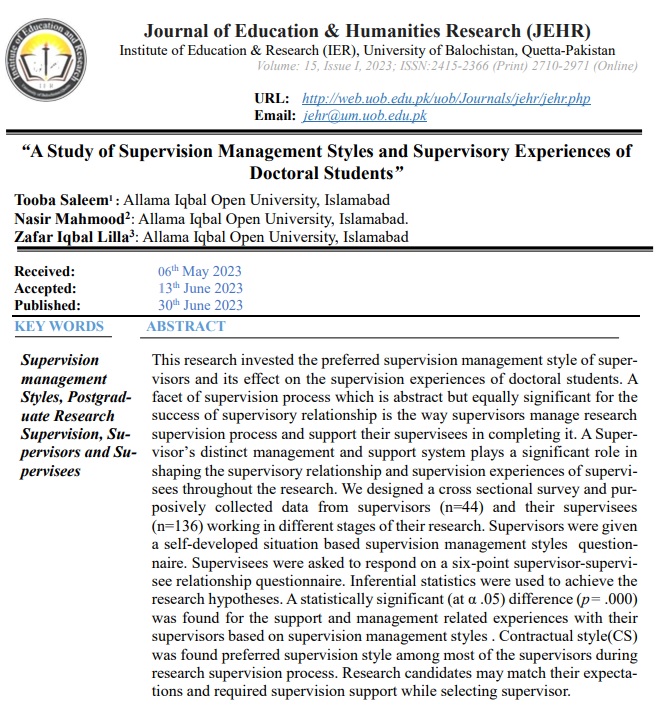A Study of Supervision Management Styles and Supervisory Experiences of Doctoral Students
Abstract
This research invested the preferred supervision management style of supervisors and its effect on the supervision experiences of doctoral students. A facet of supervision process which is abstract but equally significant for the success of supervisory relationship is the way supervisors manage research supervision process and support their supervisees in completing it. A Supervisor’s distinct management and support system plays a significant role in shaping the supervisory relationship and supervision experiences of supervisees throughout the research. We designed a cross sectional survey and purposively collected data from supervisors (n=44) and their supervisees (n=136) working in different stages of their research. Supervisors were given a self-developed situation based supervision management styles questionnaire. Supervisees were asked to respond on a six-point supervisor-supervisee relationship questionnaire. Inferential statistics were used to achieve the research hypotheses. A statistically significant (at α .05) difference (p= .000) was found for the support and management related experiences with their supervisors based on supervision management styles . Contractual style(CS) was found preferred supervision style among most of the supervisors during research supervision process. Research candidates may match their expectations and required supervision support while selecting supervisor.
References
Alzahrani, K. (2017). Metacognition and Its Role in Mathematics Learning: An Exploration of the Perceptions of a Teacher and Students in a Secondary School. International Electronic Journal Of Mathematics Education, 12(3), 521-537. Retrieved April 30, 2019 from https://www.iejme.com/download/metacognition-and-its-role-in-mathematics-learning-an-exploration-of-the-perceptions-of-a-teacher.pdf
Archarya, B. (2017). Factors Affecting Difficulties in Learning Mathematics by Mathematics Learners. International Journal of Elementary Education, 6(2), 8-15. Retrieved June 18, 2019 from 10.11648.j.ijeedu.20170602.11.pdf
Behlol, M., Akbar, R. &Sehrish, H. (2018). Effectiveness of Problem-Solving Method in Teaching Mathematics at Elementary Level. Bulletin of Education and Research, 40(1), 231-244. Retrieved April 22, 2019 from http://pu.edu.pk/images/journal/ier/PDF-FILES/17_40_1_18.pdf
Crawford, C. (2018). What Metacognition Looks Like in The Primary Classroom. A 7-Steps Prac-tical Approach to Maths Teaching. Retrieved April 28, 2019 from https://thirdspacelearning.com/blog/7-steps-eef-metacognition-primary-classroom-maths/
Gartmann, S. & Freiberg, M. Metacognition and Mathematical Problem solving: Helping Students to ask The Right Questions. The Mathematics Educator, 6(1). Retrieved April 30, 2019 from https://pdfs.semanticscholar.org/224f/b1d710c5a47df50cee2981c4b3e5514732b2.pdf
Hughes, B. (1974). Heuristic Teaching in Mathematics. Educational Studies inMathematics, 5(3), 291-299. Retrieved April,23 2019 from http://www.jstor.org/stable/3482053
Izzati, L.R., Mahmudi, A. (2018). The influence of metacognition in mathematical problem solv-ing. Journal of physics: conference series, 1097. Retrieved June 19, 2019 from https://iopscience.iop.org/article/10.1088/1742-6596/1097/1/012107/pdf
James, W., Wilson, Maria, L., Fernandez, & Hadaway, N. (1993). Mathematical Problem Solving. Retrieved April 22, 2019 from https://staff.tarleton.edu/brawner/coursefiles/507/Problem%20solving%20article%20by%20Wilson.pdf
Kapa, E. (2001). A Metacognitive Support during the Process of Problem Solving in a Computer-ized Environment. Educational Studies in Mathematics, 47(3), 317-336. Retrieved from http://www.jstor.org/stable/3483321
Magno, C. (2011). The Use of Study Strategies on Mathematical Problem-Solving. The In-ternational Journal of Research and Review, 6(2). Retrieved April 25, 2019 from https://www.researchgate.net/publication/277405378
Marsh, J. (2018). Why Math word Problems are Important? Retrieved April 18, 2019 from https://medium.com/@john_marsh7/why-math-word-problems-are-important-14c5d0670b6b
Morgan, G., Furse, E., & Nicolson, R.I. (1995). Learning Problem Solving Heuristics From Worked Examples. First European Cognitive Science Conference, INRIA Press. Retrieved June 19, 2019 from https://pdfs.semanticscholar.org/9c71/afc2ee8186e0e2cb1f5d18a48b7c4b9ad04a.pdf
Peter, L., Manuel, S., Uldarico, M. & Regina, B. (2016). Problem-Solving in Mathematics Educa-tion. Retrieved April 18, 2019 from https://link.springer.com/chapter/10.1007/978-3-319-40730-2_1
Polya, G. (1957). How to Solve It: A new aspect of mathematical method, (2nd ed). Princeton, Nj: Princeton University. Retrieved April 20, 2019 from https://slideplayer.com/slide/8156823/
Robert, R., Reid, Rock, M. (2012). Self-Instruction, (4th ed). Retrieved April 30, 2019 from https://www.sciencedirect.com/topics/social-sciences/self-instruction
Robinson, K. & Dr. Hutchinson, L. (2014). Math Heuristics. Retrieved April 28, 2019 from https://www.ldatschool.ca/math-heuristics/
Rodrigues, N. (2015). Heuristics in Problem Solving for the Teaching and Learning of Mathemat-ics. Retrieved April 22, 2019 from https://estudogeral.uc.pt/bitstream/10316/27073/3/Heuristics%20in%20Problem%20Solving%20for%20the%20Teaching%20and%20Learning%20of%20Mathematics.pdf
Saleem, T., & Mahmood, N. (2017). Influence of the supervision related background variables on the supervisees’ supervision experiences at postgraduate level. Pakistan Journal of Educa-tion, 34(2), 73-99.Retrieved July 14, 2020 from file:///C:/Users/ftc/Desktop/Tooba%20Saleem.pdf
Silao, I.V. (2018). Factors Affecting the Mathematics Problem Solving Skills of Filipino Pupils. International Journal of Scientific and Research Publications, 8(2), 487-497. Retrieved June 18, 2019 from http://www.ijsrp.org/research-paper-0218/ijsrp-p7461.pdf
Tong, G. (2011). Heuristics Methods Used In Mathematics. Educational Publishing House Pte Ltd. Retrieved April 22, 2019 from http://www.eph.com.sg/23-tips/56-heuristics-methods-used-in-mathematics
Vereijken, M. W. C., van der Rijst, R. M., van Driel, J. H., & Dekker, F. W. (2018). Novice super-visors’ prac-tices and dilemmatic space in supervision of student research projects. Teaching in Higher Education, 23(4), 522–542. https://doi.org/10.1080/13562517.2017.1414791
Videnovik, M &Karadimce, A. (2018). Introduction of 21st Century Skills in Primary Schools:Case Study Macedonia.Retrieved November 23, 2020 fromhttps://www.researchgate.net/publication/327871406_Introduction_of_21st_Century_Skills_in_Primary_Schools_Case_Study_Macedonia
Woolderink, M., Putnik, K., & Klabbers, G. (2015). The voice of PhD candidates and PhD super-visors. A qual-itative exploratory study amongst PhD candidates and supervisors to evalu-ate the relational aspects of PhD supervision in the Netherlands. International Journal of Doctoral Studies, 10(10), 217–235. https://doi.org/10.28945/2276
Wong, P. (2008). Metacognition in Mathematical Problem Solving. Singapore Journal of Educa-tion, 12(2), 48-58. Retrieved April 29, 2019 from https://www.tandfonline.com/doi/abs/10.1080/02188799208547691?journalCode=cape19&
Zhu, Zheng. (2007). Gender differences in mathematical problem solving patterns: A review of literature. International Education Journal, 8(2), 187-203. Retrieved June 18, 2019 fromhttps://files.eric.ed.gov/fulltext/EJ834219.pdf




